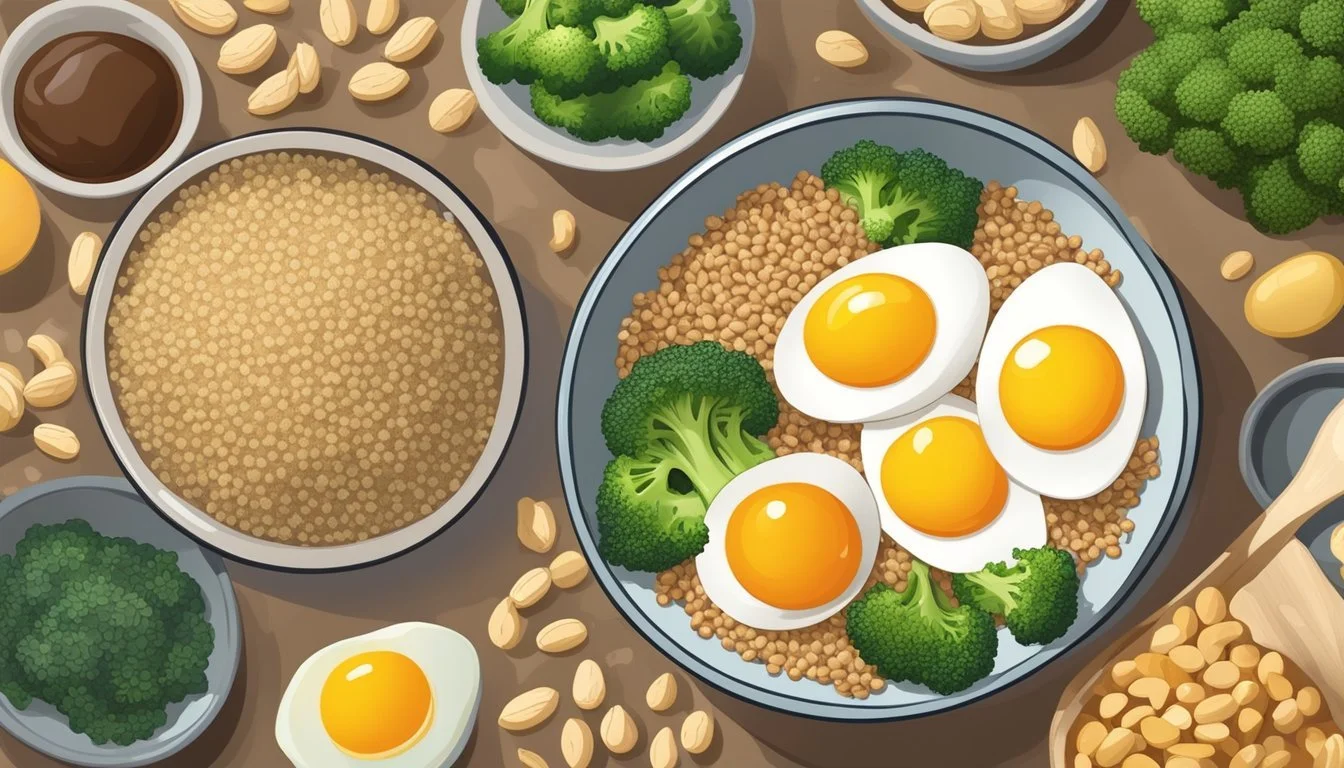Essential Choline-Rich Foods
Essential Nutrients for Brain and Liver Health
Choline is an essential nutrient that plays a crucial role in brain health and metabolism. It helps in the formation of the neurotransmitter acetylcholine, which is involved in memory and muscle control. Choline is also important for the structural integrity of cell membranes and assists in lipid transport and metabolism.
Understanding which foods are high in choline can help ensure you are meeting your daily nutritional needs. This article explores various sources of choline, which can be found in both animal and plant-based foods.
1) Beef Liver
Beef liver stands out as one of the top sources of choline. It offers over 414 milligrams of choline per 100 grams, making it incredibly nutrient-dense.
In addition to choline, beef liver is rich in protein, iron, and vitamin A. This makes it a comprehensive addition to a balanced diet.
Including beef liver in meals can support cognitive function and liver health, attributed to its high choline content. Given its nutrient profile, it’s favored by many for maintaining optimal health.
2) Egg yolks
Egg yolks are one of the richest sources of choline, a vital nutrient for brain and liver health.
A single large egg provides about 147 mg of choline, making it a significant contributor to daily intake. Most of this nutrient is concentrated in the yolk, so consuming whole eggs is essential.
For those aiming to meet their daily choline requirements, a typical breakfast of 2-3 eggs can cover 50-75% of the recommended daily intake.
The choline content in egg yolks supports various bodily functions, including cell membrane integrity and neurotransmitter production. This makes egg yolks particularly beneficial for cognitive function and overall cellular health.
Egg yolks are versatile and can be included in many dishes, from breakfast scrambles to salads and sauces. This adaptability makes it easy to incorporate choline-rich foods into everyday meals.
While dietary cholesterol in egg yolks was once a concern, current research supports their health benefits when consumed as part of a balanced diet.
3) Chicken Breast
Chicken breast is a versatile and popular source of protein. It is widely used in various cuisines due to its mild flavor and ease of preparation. Beyond its protein content, chicken breast also provides a significant amount of choline.
A 3-ounce serving of roasted chicken breast contains approximately 72 milligrams of choline. This amount fulfills around 13-17% of the daily value, depending on dietary needs.
Including chicken breast in one's diet can help meet choline requirements. Choline is essential for brain health, muscle function, and liver metabolism. Combining chicken breast with other choline-rich foods, like eggs or fish, can further enhance nutrient intake.
Chicken breast can be prepared in numerous ways, such as grilling, baking, or poaching. Its lean nature makes it a healthy option that fits well into various dietary plans.
4) Atlantic Cod
Atlantic cod is an excellent source of choline, a vital nutrient for brain and liver health. A single 3-ounce serving of Atlantic cod delivers approximately 71 milligrams of choline, constituting 13% of the daily value for people assigned male at birth and 17% for those assigned female at birth.
This fish is also known for its low-fat content, making it a healthy choice. It contains minimal amounts of polyunsaturated fats, including omega-3 fatty acids, which support cardiovascular health. Each 4-ounce serving of Atlantic cod provides about 0.1 grams of DHA and 0.04 grams of EPA, both beneficial omega-3 fatty acids.
Besides choline, Atlantic cod is rich in other essential nutrients such as vitamins B12 and D. These vitamins play crucial roles in maintaining energy levels and bone health. The modest caloric content also makes it suitable for various diets, including low-calorie and low-fat diets.
Incorporating Atlantic cod into meals is straightforward due to its mild flavor and versatility. It can be baked, grilled, or cooked using dry heat methods, retaining its nutritional benefits. This makes Atlantic cod a favorable option for those looking to increase their choline intake through diet.
5) Soybeans
Soybeans are an excellent source of choline, making them a valuable food for those seeking to boost their intake of this essential nutrient.
With 216 milligrams of choline per serving, raw soybeans deliver a significant amount of this nutrient. For vegans and vegetarians, soybeans offer a plant-based alternative to meat and dairy sources.
Roasted soybeans, often consumed as a snack, contain approximately 107 milligrams of choline per half-cup serving. This makes them a convenient option for increasing choline intake on the go.
Additionally, soy products like tofu, tempeh, and soy milk also contribute to choline intake, making them versatile additions to various meals.
Incorporating soybeans into one's diet can support liver function, muscle health, and brain development, all of which rely on adequate choline levels.
6) Quinoa
Quinoa is a versatile grain known for its high nutritional value. One significant benefit of quinoa is its choline content. When cooked, a one-cup serving of quinoa provides 43 milligrams of choline.
This makes quinoa a beneficial addition to a diet aimed at choline intake.
Aside from choline, quinoa is rich in protein, fiber, and essential amino acids. It is a complete protein source, which is particularly valuable for those following plant-based diets. These benefits make quinoa a staple in balanced and health-conscious diets.
Quinoa's mild flavor and adaptable texture allow it to be used in a variety of recipes. It can be included in salads, soups, or even as a side dish. This flexibility makes it easy to incorporate quinoa into daily meals, ensuring a consistent intake of choline and other nutrients.
7) Brussels sprouts
Brussels sprouts are a nutritious vegetable that offers a notable amount of choline. A 1-cup serving of cooked Brussels sprouts provides approximately 63 milligrams of choline.
This amount represents roughly 11% of the recommended daily value for an average adult, which can be beneficial for those looking to increase their choline intake.
In addition to choline, Brussels sprouts are rich in vitamins, fiber, and antioxidants. They can be easily incorporated into various meals, whether steamed, roasted, or added to salads.
Eating Brussels sprouts regularly may support liver function and brain health due to their choline content. Their versatility in cooking makes them a practical choice for a balanced diet.
8) Cauliflower
Cauliflower is a cruciferous vegetable that provides a significant amount of choline. One cup of cooked cauliflower contains approximately 72 mg of choline, which is about 13% of the daily value.
Besides being high in choline, cauliflower is also rich in vitamins and minerals. It contains vitamin C, folate, and vitamin K, making it a nutritious addition to any diet.
Including cauliflower in meals can help boost choline intake. It can be steamed, roasted, or added to soups and salads. This versatility makes it easy to incorporate into various dishes, providing both flavor and nutrition.
9) Broccoli
Broccoli is known for its nutritional benefits, including its moderate choline content. A half-cup of cooked, chopped broccoli contains approximately 31 milligrams of choline, making it a valuable addition to a diet aimed at increasing choline intake.
This vegetable is particularly beneficial for individuals who avoid meat and dairy products. It provides essential nutrients without the need for animal-derived foods.
In addition to choline, broccoli also offers fiber, vitamins C and K, and various antioxidants. It supports overall health and well-being, making it a versatile option in a balanced diet. Broccoli can be easily incorporated into meals, whether steamed, roasted, or added to salads and soups.
10) Wheat Germ
Wheat germ is a nutrient-dense component of the wheat kernel and an excellent source of choline.
A single ounce of toasted wheat germ provides approximately 51 milligrams of choline. This makes it a valuable addition to the diet for those looking to increase their choline intake.
In addition to choline, wheat germ is rich in vitamins, minerals, protein, and fiber. It contains B vitamins and healthy fats, supporting overall nutrition.
Wheat germ can be easily incorporated into various dishes. It works well in smoothies, cereals, and baked goods, adding a subtle nutty flavor.
People can enjoy wheat germ as a topping for yogurt or salads, enhancing both texture and nutritional value. Its versatility makes it a convenient option for meal planning.
Overall, wheat germ stands out as a practical and nourishing choice for boosting choline levels in the diet. Its combination of essential nutrients supports health and wellness effectively.
What Is Choline?
Choline is a vital nutrient that plays a crucial role in several bodily functions. It is essential for liver function, brain development, and muscle movement.
Importance of Choline
Choline supports cognitive function and helps maintain a healthy nervous system.
It is particularly important during pregnancy, as it contributes to fetal brain and spinal cord development.
Adults require choline to prevent liver damage and reduce the risk of fatty liver disease.
Daily intake recommendations vary, but most adults need between 425-550 mg per day.
How Choline Functions in the Body
Choline is involved in the production of acetylcholine, a neurotransmitter that influences memory and muscle control.
It also plays a role in the metabolism of fats and helps in the creation of cell membranes.
Additionally, choline assists in the process of methylation, which impacts gene expression and the integrity of DNA.
Health Benefits of Food High in Choline
Choline is vital for several bodily functions, including brain development, liver health, and cardiovascular well-being. Incorporating choline-rich foods into your diet can provide significant health benefits.
Cognitive Health
Choline is essential for brain function. It is a precursor to acetylcholine, a neurotransmitter important for memory, mood, and muscle control. Regular consumption of choline-rich foods can help maintain cognitive abilities and may lower the risk of neurodegenerative diseases.
Studies have shown that adequate choline intake supports the brain's development from the fetal stage through old age. Foods like eggs and lean meat, which are high in choline, can contribute to sharper memory and better focus.
Liver Function
Choline plays a crucial role in maintaining liver health. It helps in the metabolism of fats and prevents the accumulation of fat in the liver, reducing the risk of non-alcoholic fatty liver disease (NAFLD).
Deficiency in choline can lead to liver damage and muscle damage. Foods such as fish, nuts, and certain vegetables are excellent sources of choline and can support effective liver function.
Heart Health
Choline also impacts cardiovascular health. It is involved in breaking down homocysteine, an amino acid associated with an increased risk of heart diseases.
Consuming foods high in choline can help maintain healthy homocysteine levels, thereby supporting heart health. Choline-rich foods like eggs, poultry, and cruciferous vegetables can be beneficial in reducing the risk of heart disease.
Recommended Daily Intakes and Sources
Choline is an essential nutrient crucial for brain and nervous system function. Knowing the recommended daily intake and where to find this nutrient in your diet helps ensure you're getting enough choline.
Recommended Choline Intakes
The Institute of Medicine recommends specific daily choline intakes based on age, sex, and life stage. Adult men typically need 550 mg per day, while adult women should aim for 425 mg.
Pregnant and breastfeeding women have higher requirements due to increased demands, needing 450 mg and 550 mg per day, respectively.
Age Group Recommended Intake (mg/day) Men (19+ years) 550 Women (19+ years) 425 Pregnant Women 450 Breastfeeding Women 550
Factors Influencing Choline Needs
Several factors can affect choline requirements. Genetics play a significant role, as some individuals may have variations in genes that influence choline metabolism.
Dietary habits also impact choline needs. People consuming diets high in folate may need more choline due to its interaction with folate.
Additionally, certain populations, like pregnant women, require more choline to support fetal development and maintain maternal health.
Understanding these factors can help tailor choline intake to specific needs, ensuring optimal health outcomes.






